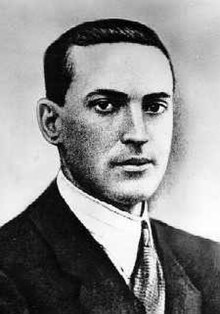Lev Vygotsky
Appearance

Lev Semyonovich Vygotskij (November 17 [O.S. November 5] 1896 – June 11, 1934) was a Soviet psychologist, known for his work on psychological development in children. He is known for his concept of the zone of proximal development (ZPD): the distance between what a student (apprentice, new employee, etc.) can do on their own, and what they can accomplish with the support of someone more knowledgeable about the activity. Vygotsky saw the ZPD as a measure of skills that are in the process of maturing, as supplement to measures of development that only look at a learner's independent ability.
| This article about a psychologist is a stub. You can help out with Wikiquote by expanding it! |
Quotes
[edit]- Through others, we become ourselves.
- Vygotskij, L. S. (1987). The genesis of higher mental functions. In R. Reiber (Ed.), The history of the development of higher mental functions (Vol. 4, pp. 97-120). New York: Plennum.
- As in the focus of a magnifying glass, play contains all developmental tendencies in a condensed form and is itself a major source of development.
- Vygotsky, L. S. (1930) Mind in Society: The Development of Higher Psychological Processes Cambridge, Mass.: Harvard University Press p.102
- From the great creations of Spinoza, as from distant stars, light takes several centuries to reach us. Only the psychology of the future will be able to realize the ideas of Spinoza.
- Vygotsky [original in Russian]
- My intellect has been shaped under the sign of Spinoza's words, and it has tried not to be astounded, not to laugh, not to cry, but to understand.
- Vygotsky, in his dissertation thesis Psychology of Art [original in Russian]
- The philosophical perspective opens before is at this point of our study. For the first time in the process of psychological studies we can resolve essentially purely philosophical problems by means of a psychological experiment and demonstrate empirically the origin of the freedom of human will. We cannot trace in all its completeness the philosophical perspective opening before us here. We expect to do this in another work devotes to philosophy. Now we shall try only to note this perspective in order to see most clearly the place we have reached. We cannot help but note that we have come to the same understanding of freedom and self-control that Spinoza developed in his “Ethics.”
- Vygotsky, Self-Control, 1931 [original in Russian]
- ...In a few words, we can define the true relation of Spinozist teaching on passions to explanatory and descriptive psychology of emotions, saying that, practically speaking, this teaching on solving the one and only problem, the problem of a deterministic, causal explanation of what is higher in the life of human passions, also partially contains explanatory psychology, retaining the idea of causal explanation but rejecting the problem of the higher in human passions, and descriptive psychology, rejecting the idea of a causal explanation and retaining the problem of the higher in the life of human passions. Thus, forming its deepest and most internal nucleus, Spinoza's teaching contains specifically what is in neither of the two parts into which contemporary psychology of emotions has disintegrated: the unity of the causal explanation and the problem of the vital significance of human passions, the unity of descriptive and explanatory psychology of feelings. For this reason, Spinoza is closely connected with the most vital, the most critical news of the day for contemporary psychology of emotions, news of the day which prevails in it, determining the paroxysm of crisis that envelops it. The problems of Spinoza await their solution, without which tomorrow’s day in our psychology is impossible.
- Vygotsky, The Teaching about Emotions, 1932 [original in Russian]
External links
[edit] Encyclopedic article on Lev Vygotsky on Wikipedia
Encyclopedic article on Lev Vygotsky on Wikipedia Media related to Lev Vygotsky on Wikimedia Commons
Media related to Lev Vygotsky on Wikimedia Commons
